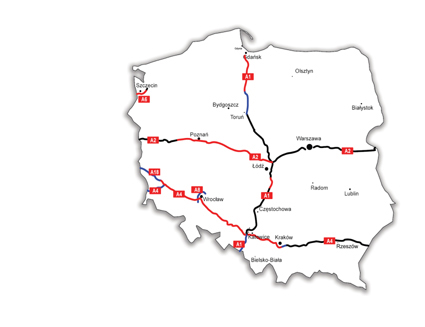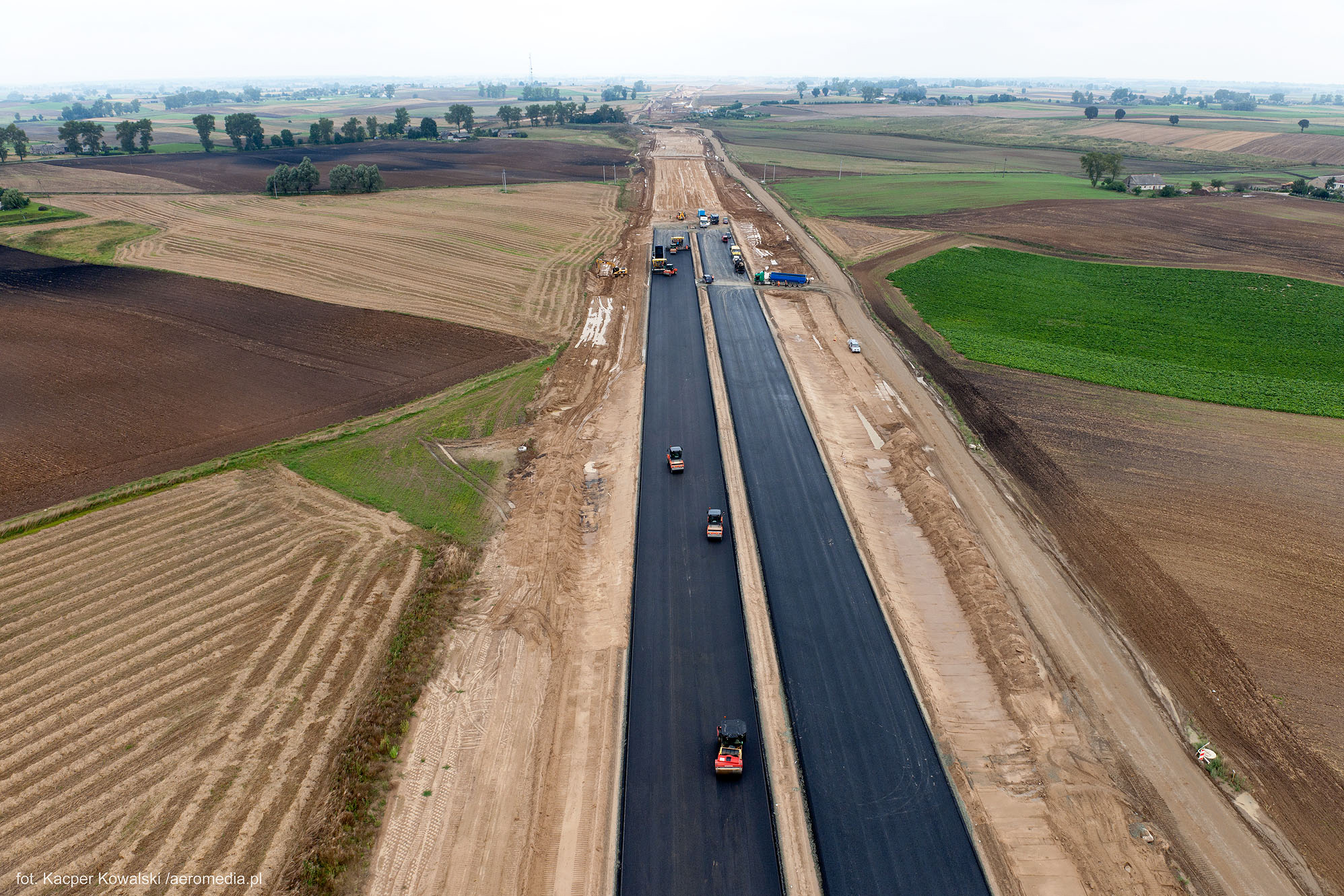
The European football championships are among a number of things pushing Poland's ambitious highway building programme. Patrick Smith reports.
Poland is planning to spend a colossal €4.57 billion on road projects in 2009, a 35% increase over the previous year. The news will be welcomed as Poland, with a population of 38.5 million, is lacking in top quality highways and this could prove a bar to improved economic prosperity. At present the road transport system is said to be one of the worst in eastern Europe, and is slowing down the movement of goods and people, and thus economic development.
Poland's road infrastructure with around 750km of motorways, and 550km of dual carriageways, is underdeveloped, and although it does have an extensive road system (204,000km), mainly of two-lane routes, it is missing the minimum required density of motorways and expressways.
But with the country co-hosting the UEFA 2012 football championships with Ukraine, the government has said it intends to construct around 900km of new highways to be completed before the event, and indeed has earmarked some €27.5 billion from various sources, including European Union funding, to carry out the work.
The country joined the EU in May, 2004, but much of its road infrastructure still needs upgrading or renewing to carry the increasing number of vehicles, especially trucks, that have to use the existing network, inflicting further damage on the narrow routes.
The just-published 8th edition of the European Road Statistics from ERF-IRF BPC (
A new finance system for road investment has been established in Poland, and this is designed to help deal with the funding issues that beset the country's highway expansion programme earlier this year following the banking crisis. Under the new National Road Fund (KFD), capital for new road projects in Poland will be provided by KFD, which will be receiving the money from, among others, the issue of the so-called infrastructural bonds.
Before the end of 2009, KFD will also get loans worth €1.16 billion in total from the
The KFD is allocating €3.31 billion for road projects during 2009. It is also possible that the second largest Polish bank, Pekao, will cooperate with the Polish government regarding road project finance. However, no final decisions regarding this matter have yet been made. A 30% cost decrease will reduce the spending on roads planned by the government for 2009.
But it appears that things are again looking up in Poland after its ambitious highway building programme hit the financial buffers earlier this year due to the problems with the banking industry. This resulted in work being stopped and plans being put on hold. However, new funding sources are being found and work on many stalled projects has resumed while new projects are once again in planning.
Currently three major expressways spanning the entire country are being planned or built, to be finished some time in the next decade, and most of the largest cities (Poznan, Wroclaw, Lódz, Warsaw, Kraków, Katowice) will have an expressway connecting them with the expressway network of Western Europe. There are also plans to build a system of express roads which will not be expressways but will have many of their features.
The planned 564km A1 motorway (part of European route E75 covering Norway, Finland, Poland, Czech Republic, Slovakia, Hungary, Serbia, the Republic of Macedonia and Greece) will run between the Polish-Czech border; the 651km A2 will run between the Polish-German and Polish-Belorussian border, while the A4 (670km) will also run to the German border and the Ukrainian border.
Of the current €4.57 billion government spend, the southern Silesia region will account for 20% of the total budget, doubling the investment made in the region in the previous year.
A loan from the EIB will help
The project can now go ahead on the final signature of the Infrastructure Minister.
The total value of the funds required by AW to carry out its build-operate contract is €1.3 billion.
The Gdañsk Transport Company consortium (
The contract for client,
The construction project is for a total of 62km of four-lane highway between Czerniewice near Torun and Nowe Marzy where the project joins the completed first phase, some 100km south of Gdansk.
The new phase includes two major bridges of which the longest across the Vistula River will be around 2km long.
The first phase of was for 90km with 26km opened in 2007, a year ahead of schedule, and GTC is responsible for operations and maintenance of both phases (152km in total) until 2039.
Meanwhile, work on a section of the A1 is hitting technical problems. The highway will run close to a runway for Katowice's Pyrzowice airport, and one proposed solution is to build a tunnel for the highway. This would boost the cost of building the section to €23 million, more than was planned. A decision on the construction of the section is due in the next few months, while work is scheduled to be completed by 2014.
A consortium comprising Portuguese contractor
In addition, CET Skanska has a deal to build a bypass road in the Warsaw region. The order amounts to about €31 million and is for the Polish Road Authority.
The project, which includes seven overpasses, comprises extension of a 7km stretch of highway in Serock, about 40km north of Warsaw, and work will be completed during 2011.
Skanska is also building a new bypass in Wroclaw in a deal worth €46.77 million. The project involves the first construction stage of an eastern bypass connecting to the main road to Warsaw. This is scheduled to be completed by January 2013.
Also in Poland, a tender process for a 68km section of the A4 highway between Tarnow and Rzeszow in the south-east of the country is being called, while plans are also in hand to open the tender process for the final section of the highway, which will run to the Polish-Ukrainian border.
Another Skanska contract is to build a road link between Wroclaw's airport and the city's ring road in the city centre. The value of the contract, due to be completed in September 2010, is €10.27 million.
Recently, a consortium presided over by Skanska has won a contract to build a 14km section of a western ring road in the city of Poznan.










